must have done 的反意疑问句答疑
- 格式:doc
- 大小:26.50 KB
- 文档页数:1
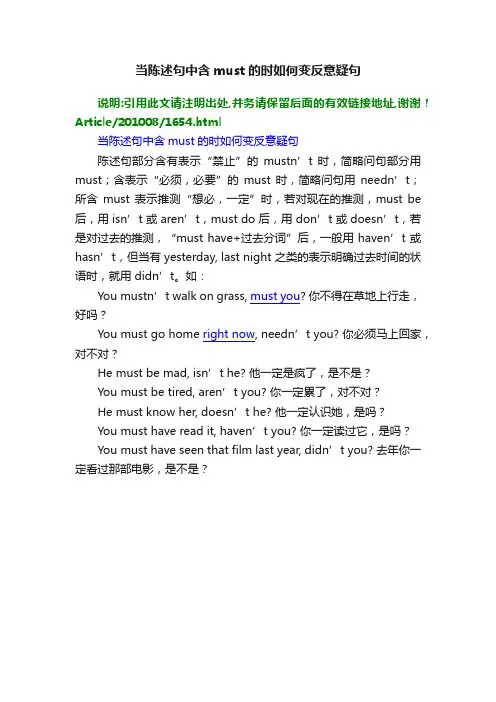
当陈述句中含must的时如何变反意疑句
说明:引用此文请注明出处,并务请保留后面的有效链接地址,谢谢!Article/201008/1654.html
当陈述句中含must的时如何变反意疑句
陈述句部分含有表示“禁止”的mustn’t 时,简略问句部分用must;含表示“必须,必要”的must 时,简略问句用needn’t;所含must 表示推测“想必,一定”时,若对现在的推测,must be 后,用isn’t 或aren’t,must do 后,用don’t 或doesn’t,若是对过去的推测,“must have+过去分词”后,一般用haven’t 或hasn’t,但当有 yesterday, last night 之类的表示明确过去时间的状语时,就用didn’t。
如:
You mustn’t walk on grass, must you? 你不得在草地上行走,好吗?
You must go home right now, needn’t you? 你必须马上回家,对不对?
He must be mad, isn’t he? 他一定是疯了,是不是?
You must be tired, aren’t you? 你一定累了,对不对?
He must know her, doesn’t he? 他一定认识她,是吗?
You must have read it, haven’t you? 你一定读过它,是吗?
You must have seen t hat film last year, didn’t you? 去年你一定看过那部电影,是不是?。
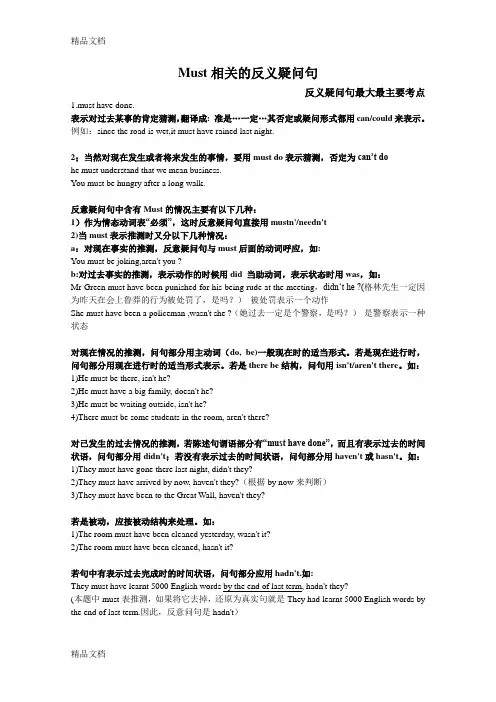
精品文档精品文档Must相关的反义疑问句反义疑问句最大最主要考点1.must have done.表示对过去某事的肯定猜测,翻译成: 准是…一定…其否定或疑问形式都用can/could来表示。
例如:since the road is wet,it must have rained last night.2;当然对现在发生或者将来发生的事情,要用must do表示猜测,否定为can’t dohe must understand that we mean business.You must be hungry after a long walk.反意疑问句中含有Must的情况主要有以下几种:1)作为情态动词表“必须”,这时反意疑问句直接用mustn'/needn't2)当must表示推测时又分以下几种情况:a:对现在事实的推测,反意疑问句与must后面的动词呼应,如:You must be joking,aren't you ?b:对过去事实的推测,表示动作的时候用did 当助动词,表示状态时用was,如:Mr Green must have been punished for his being rude at the meeting,didn‘t he ?(格林先生一定因为昨天在会上鲁莽的行为被处罚了,是吗?)被处罚表示一个动作She must have been a policeman ,wasn't she ?(她过去一定是个警察,是吗?)是警察表示一种状态对现在情况的推测,问句部分用主动词(do, be)一般现在时的适当形式。
若是现在进行时,问句部分用现在进行时的适当形式表示。
若是there be结构,问句用isn't/aren't there。
如:1)He must be there, isn't he?2)He must have a big family, doesn't he?3)He must be waiting outside, isn't he?4)There must be some students in the room, aren't there?对已发生的过去情况的推测,若陈述句谓语部分有“must have done”,而且有表示过去的时间状语,问句部分用didn't;若没有表示过去的时间状语,问句部分用haven't或hasn't。
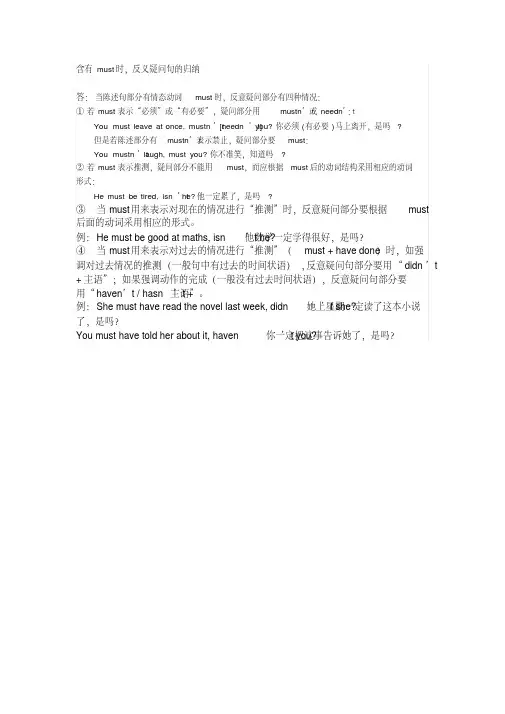
含有must时,反义疑问句的归纳
答:当陈述句部分有情态动词must时,反意疑问部分有四种情况:
:
①若must表示“必须”或“有必要”,疑问部分用mustn’t或needn’t
you?你必须(有必要)马上离开,是吗?
You must leave at once, mustn’t [needn’t]
但是若陈述部分有mustn’t表示禁止,疑问部分要must:
You mustn’t laugh, must you?你不准笑,知道吗?
②若must表示推测,疑问部分不能用must,而应根据must后的动词结构采用相应的动词
形式:
he?他一定累了,是吗?
He must be tired, isn’t
③当must用来表示对现在的情况进行“推测”时,反意疑问部分要根据must 后面的动词采用相应的形式。
他数学一定学得很好,是吗?
例:He must be good at maths, isn’t he?
④当must用来表示对过去的情况进行“推测”(must + have done)时,如强
调对过去情况的推测(一般句中有过去的时间状语),反意疑问句部分要用“didn’t + 主语”;如果强调动作的完成(一般没有过去时间状语),反意疑问句部分要
主语”。
用“haven’t / hasn’t +
她上星期一定读了这本小说例:She must have read the novel last week, didn’t she?
了,是吗?
你一定把这事告诉她了,是吗?
You must have told her about it, haven’t you?。
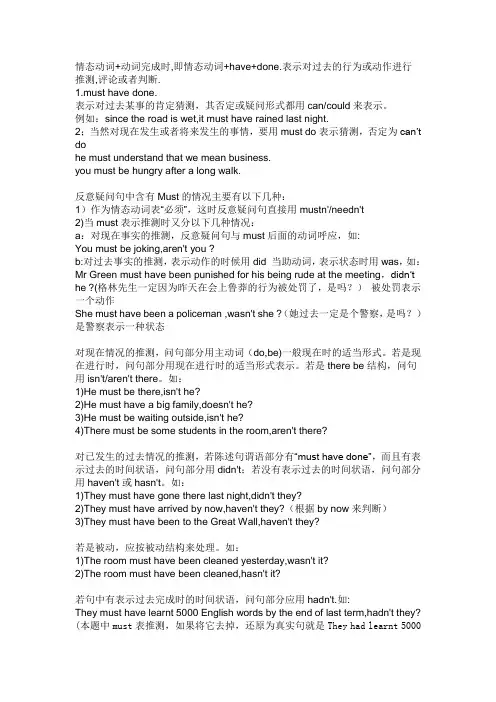
情态动词+动词完成时,即情态动词+have+done.表示对过去的行为或动作进行推测,评论或者判断.1.must have done.表示对过去某事的肯定猜测,其否定或疑问形式都用can/could来表示。
例如:since the road is wet,it must have rained last night.2;当然对现在发生或者将来发生的事情,要用must do表示猜测,否定为can’t dohe must understand that we mean business.you must be hungry after a long walk.反意疑问句中含有Must的情况主要有以下几种:1)作为情态动词表“必须”,这时反意疑问句直接用mustn'/needn't2)当must表示推测时又分以下几种情况:a:对现在事实的推测,反意疑问句与must后面的动词呼应,如:You must be joking,aren't you ?b:对过去事实的推测,表示动作的时候用did 当助动词,表示状态时用was,如:Mr Green must have been punished for his being rude at the meeting,didn‘t he ?(格林先生一定因为昨天在会上鲁莽的行为被处罚了,是吗?)被处罚表示一个动作She must have been a policeman ,wasn't she ?(她过去一定是个警察,是吗?)是警察表示一种状态对现在情况的推测,问句部分用主动词(do,be)一般现在时的适当形式。
若是现在进行时,问句部分用现在进行时的适当形式表示。
若是there be结构,问句用isn't/aren't there。
如:1)He must be there,isn't he?2)He must have a big family,doesn't he?3)He must be waiting outside,isn't he?4)There must be some students in the room,aren't there?对已发生的过去情况的推测,若陈述句谓语部分有“must have done”,而且有表示过去的时间状语,问句部分用didn't;若没有表示过去的时间状语,问句部分用haven't或hasn't。
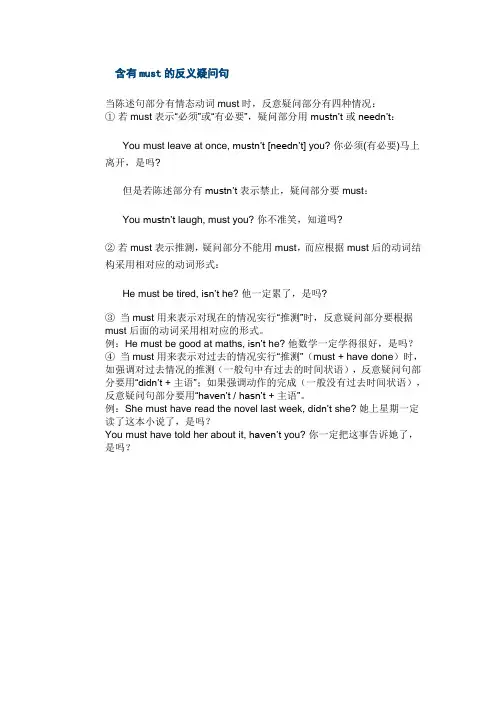
含有must的反义疑问句
当陈述句部分有情态动词must时,反意疑问部分有四种情况:
①若must表示“必须”或“有必要”,疑问部分用mustn’t或needn’t:
You must leave at once, mustn’t[needn’t] you? 你必须(有必要)马上离开,是吗?
但是若陈述部分有mustn’t表示禁止,疑问部分要must:
You mustn’t laugh, must you? 你不准笑,知道吗?
②若must表示推测,疑问部分不能用must,而应根据must后的动词结构采用相对应的动词形式:
He must be tired, isn’t he? 他一定累了,是吗?
③当must用来表示对现在的情况实行“推测”时,反意疑问部分要根据must后面的动词采用相对应的形式。
例:He must be good at maths, isn’t he? 他数学一定学得很好,是吗?
④当must用来表示对过去的情况实行“推测”(must + have done)时,如强调对过去情况的推测(一般句中有过去的时间状语),反意疑问句部分要用“didn’t + 主语”;如果强调动作的完成(一般没有过去时间状语),反意疑问句部分要用“haven’t / hasn’t + 主语”。
例:She must have read the novel last week, didn’t she? 她上星期一定读了这本小说了,是吗?
You must have told her about it, haven’t you? 你一定把这事告诉她了,是吗?。
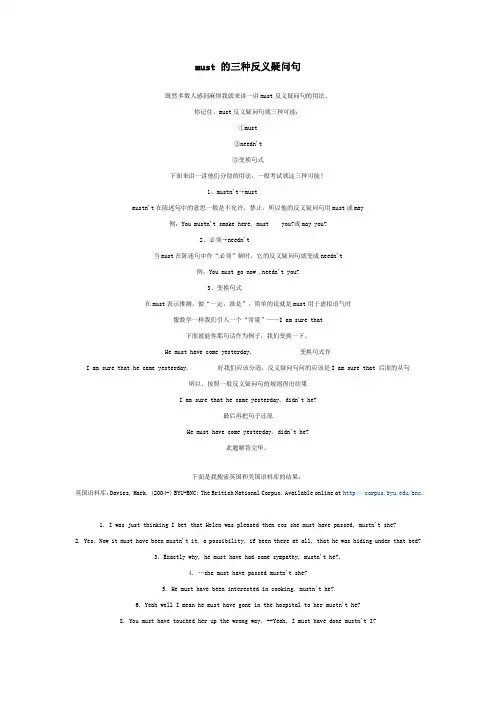
must 的三种反义疑问句既然多数人感到麻烦我就来讲一讲must反义疑问句的用法。
你记住,must反义疑问句就三种可能:①must②needn't③变换句式下面来讲一讲他们分别的用法,一般考试就这三种可能!1、mustn't→mustmustn't在陈述句中的意思一般是不允许,禁止,所以他的反义疑问句用must或may例:You mustn't smoke here, must you?或may you?2、必须→needn't当must在陈述句中作“必须”解时,它的反义疑问句就变成needn't例:You must go now ,needn't you?3、变换句式在must表示推测,做“一定,准是”,简单的说就是must用于虚拟语气时像数学一样我们引入一个“常量”——I am sure that下面就能你那句话作为例子,我们变换一下。
He must have come yesterday. 变换句式作I am sure that he came yesterday. 好我们应该分清,反义疑问句问的应该是I am sure that 后面的从句所以,按照一般反义疑问句的规则得出结果I am sure that he came yesterday, didn't he?最后再把句子还原He must have come yesterday,didn't he?此题解答完毕。
下面是我搜索英国和美国语料库的结果:英国语料库:Davies, Mark. (2004-) BYU-BNC: The British National Corpus. Available online at /bnc.1. I was just thinking I bet that Helen was pleased then cos she must have passed, mustn't she?2. Yes. Now it must have been mustn't it, a possibility, if been there at all, that he was hiding under that bed?3. Exactly why, he must have had some sympathy, mustn't he?.4. …she must have passed mustn't she?5. He must have been interested in cooking, mustn't he?6. Yeah well I mean he must have gone in the hospital to her mustn't he?8. You must have touched her up the wrong way. --Yeah, I must have done mustn't I?9. Now it must have been mustn't it, a possibility, if been there at all, that he was hiding under that bed?10. Exactly why, he must have had some sympathy, mustn't he?.11. He must have been interested in cooking, mustn't he?12. Yeah well I mean he must have gone in the hospital to her mustn't he?13. Yeah, I must have done mustn't I?14. Somebody must have reported him, though, mustn't they?15. Abruptly she stood up and crossed to the window. "I must have done , mustn't I?"16. You must have seen the seals, though, didn't you?17. Exactly why, he must have had some sympathy , mustn't he ?.18. And your sister's ten years older than you so they must 've been there ten years plus , mustn't they ?19. They have a serious side but they must have a lighter side as well , mustn't they ?20. It must be , mustn't it ?21. Yeah. The profit would have been minus cos the costs would still be there so it must be a cancellation . Mustn'tit ?22. Yes, now this shows it must be his imagination , mustn't it ?23. …they must know there is a risk , mustn't they .24. It must mean something , mustn't it ?25. Six pairs of knickers must be enough , mustn't it , Charlie?26. Then it must be Madame V in Paris , mustn't it ?27. Everybody who sees her must love her , mustn't they , Ellen?28. But he must like her a bit , mustn't he ?29. Saturday night. Yeah? Yeah. So he must be doing well, mustn’t he?30. Yeah. Okay. So what, they mus t be staying, staying the Saturday night, mustn’t they?31. You must have seen the seals, though, didn’t you?(用didn't的只搜到这一例)美国语料库:/1. You must have enjoyed those, didn't you?2. And you must have had a name, didn't you?3. Oh Patrick, I must have told you -- didn't I?4. Must have seemed like an eternity, didn't it, holding your breath?5. Must have had three kids, did she?6. I'm sure they must be exaggerating, aren't they, Professor?7. You must have called an undertaker by now, haven't you?还是英国语料库:推断:It must mean something , mustn't it?Everybody who sees her must love her , mustn't they, Ellen?But he must like her a bit , mustn't he?Yes, now this shows it must be his imagination , mustn't it?he must have had some sympathy , mustn't he?必须:Well they must do them Sarah , mustn't they?First I must wash , mustn't I?。
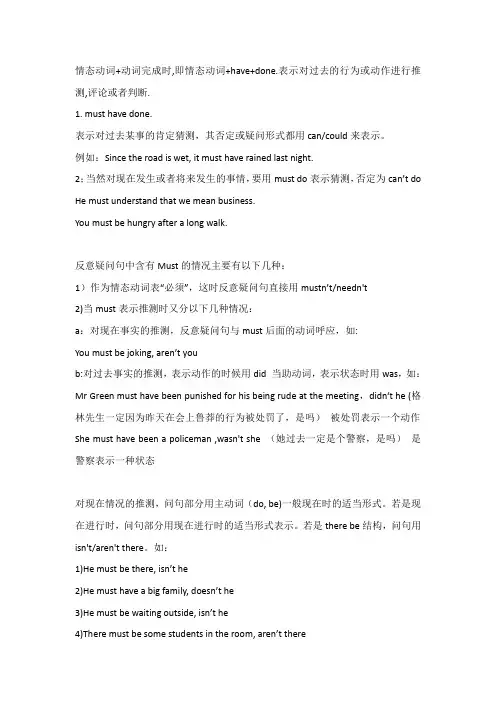
情态动词+动词完成时,即情态动词+have+done.表示对过去的行为或动作进行推测,评论或者判断.1. must have done.表示对过去某事的肯定猜测,其否定或疑问形式都用can/could来表示。
例如:Since the road is wet, it must have rained last night.2;当然对现在发生或者将来发生的事情,要用must do表示猜测,否定为can’t do He must understand that we mean business.You must be hungry after a long walk.反意疑问句中含有Must的情况主要有以下几种:1)作为情态动词表“必须”,这时反意疑问句直接用mustn’t/needn't2)当must表示推测时又分以下几种情况:a:对现在事实的推测,反意疑问句与must后面的动词呼应,如:You must be joking, aren’t youb:对过去事实的推测,表示动作的时候用did 当助动词,表示状态时用was,如:Mr Green must have been punished for his being rude at the meeting,didn‘t he (格林先生一定因为昨天在会上鲁莽的行为被处罚了,是吗)被处罚表示一个动作She must have been a policeman ,wasn't she (她过去一定是个警察,是吗)是警察表示一种状态对现在情况的推测,问句部分用主动词(do, be)一般现在时的适当形式。
若是现在进行时,问句部分用现在进行时的适当形式表示。
若是there be结构,问句用isn't/aren't there。
如:1)He must be there, isn’t he2)He must have a big family, doesn’t he3)He must be waiting outside, isn’t he4)There must be some students in the room, aren’t there对已发生的过去情况的推测,若陈述句谓语部分有“must have done”,而且有表示过去的时间状语,问句部分用didn't;若没有表示过去的时间状语,问句部分用haven't或hasn't。
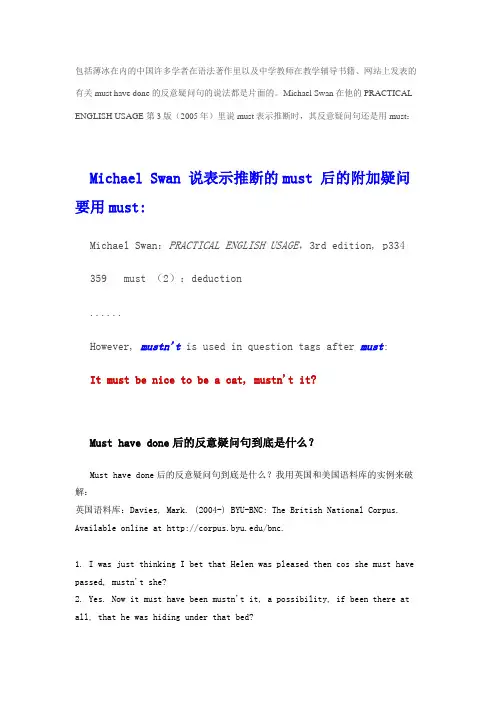
包括薄冰在内的中国许多学者在语法著作里以及中学教师在教学辅导书籍、网站上发表的有关must have done 的反意疑问句的说法都是片面的。
Michael Swan 在他的PRACTICAL ENGLISH USAGE 第3版(2005年)里说must表示推断时,其反意疑问句还是用must:Michael Swan 说表示推断的must 后的附加疑问要用must:Michael Swan:PRACTICAL ENGLISH USAGE,3rd edition, p334 359 must (2):deduction......However, mustn't is used in question tags after must:It must be nice to be a cat, mustn't it?Must have done后的反意疑问句到底是什么?Must have done后的反意疑问句到底是什么?我用英国和美国语料库的实例来破解:英国语料库:Davies, Mark. (2004-) BYU-BNC: The British National Corpus. Available online at /bnc.1. I was just thinking I bet that Helen was pleased then cos she must have passed, mustn't she?2. Yes. Now it must have been mustn't it, a possibility, if been there at all, that he was hiding under that bed?3. Exactly why, he must have had some sympathy, mustn't he?.4. …she must have passed mustn't she?5. He must have been interested in cooking, mustn't he?6. Yeah well I mean he must have gone in the hospital to her mustn't he?8. You must have touched her up the wrong way. --Yeah, I must have done mustn't I?9. Now it must have been mustn't it, a possibility, if been there at all, that he was hiding under that bed?10. Exactly why, he must have had some sympathy, mustn't he?.11. He must have been interested in cooking, mustn't he?12. Yeah well I mean he must have gone in the hospital to her mustn't he?13. Yeah, I must have done mustn't I?14. Somebody must have reported him, though, mustn't they?15. Abruptly she stood up and crossed to the window. "I must have done , mustn't I?"16. You must have seen the seals, though, didn't you?17. Exactly why, he must have had some sympathy , mustn't he ?.18. And your sister's ten years older than you so they must 've been there ten years plus , mustn't they ?19. They have a serious side but they must have a lighter side as well , mustn't they ?20. It must be , mustn't it ?21. Yeah. The profit would have been minus cos the costs would still be there so it must be a cancellation . Mustn't it ?22. Yes, now this shows it must be his imagination , mustn't it ?23. …they must know there is a risk , mustn't they .24. It must mean something , mustn't it ?25. Six pairs of knickers must be enough , mustn't it , Charlie?26. Then it must be Madame V in Paris , mustn't it ?27. Everybody who sees her must love her , mustn't they , Ellen?28. But he must like her a bit , mustn't he ?29. Saturday night. Yeah? Yeah. So he must be doing well, mustn’t he?30. Yeah. Okay. So what, they must be staying, staying the Saturday night, mustn’t they?31. You must have seen the seals, though, didn’t you?(用didn't的只搜到这一例)美国语料库:/1. You must have enjoyed those, didn't you?2. And you must have had a name, didn't you?3. Oh Patrick, I must have told you -- didn't I?4. Must have seemed like an eternity, didn't it, holding your breath?5. Must have had three kids, did she?6. I'm sure they must be exaggerating, aren't they, Professor?7. You must have called an undertaker by now, haven't you?结论: 用mustn't 构成反意疑问句见于英国英语。
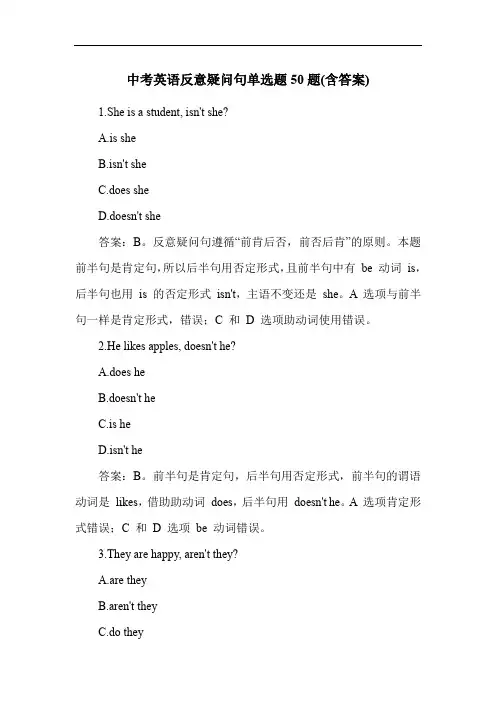
中考英语反意疑问句单选题50题(含答案)1.She is a student, isn't she?A.is sheB.isn't sheC.does sheD.doesn't she答案:B。
反意疑问句遵循“前肯后否,前否后肯”的原则。
本题前半句是肯定句,所以后半句用否定形式,且前半句中有be 动词is,后半句也用is 的否定形式isn't,主语不变还是she。
A 选项与前半句一样是肯定形式,错误;C 和D 选项助动词使用错误。
2.He likes apples, doesn't he?A.does heB.doesn't heC.is heD.isn't he答案:B。
前半句是肯定句,后半句用否定形式,前半句的谓语动词是likes,借助助动词does,后半句用doesn't he。
A 选项肯定形式错误;C 和D 选项be 动词错误。
3.They are happy, aren't they?A.are theyB.aren't theyC.do they答案:B。
前半句是肯定句,后半句用否定形式,前半句有be 动词are,后半句用aren't they。
A 选项肯定形式错误;C 和D 选项助动词错误。
4.She can swim, can't she?A.can sheB.can't sheC.does sheD.doesn't she答案:B。
前半句是肯定句,后半句用否定形式,前半句有can,后半句用can't she。
A 选项肯定形式错误;C 和D 选项助动词错误。
5.He will come, won't he?A.will heB.won't heC.does heD.doesn't he答案:B。
前半句是肯定句,后半句用否定形式,前半句有will,后半句用won't he。
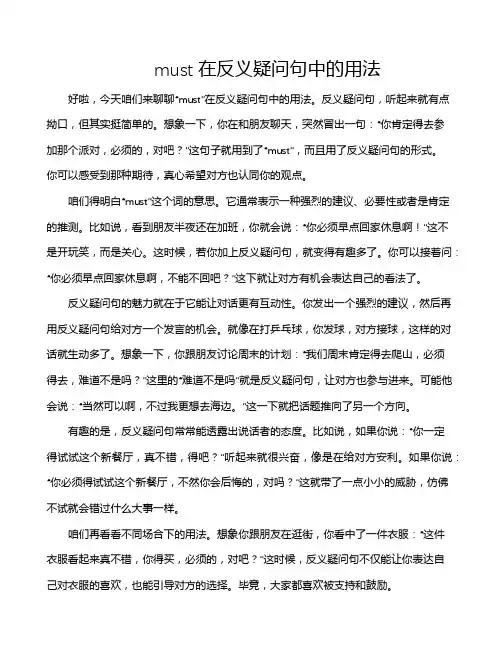
must在反义疑问句中的用法好啦,今天咱们来聊聊“must”在反义疑问句中的用法。
反义疑问句,听起来就有点拗口,但其实挺简单的。
想象一下,你在和朋友聊天,突然冒出一句:“你肯定得去参加那个派对,必须的,对吧?”这句子就用到了“must”,而且用了反义疑问句的形式。
你可以感受到那种期待,真心希望对方也认同你的观点。
咱们得明白“must”这个词的意思。
它通常表示一种强烈的建议、必要性或者是肯定的推测。
比如说,看到朋友半夜还在加班,你就会说:“你必须早点回家休息啊!”这不是开玩笑,而是关心。
这时候,若你加上反义疑问句,就变得有趣多了。
你可以接着问:“你必须早点回家休息啊,不能不回吧?”这下就让对方有机会表达自己的看法了。
反义疑问句的魅力就在于它能让对话更有互动性。
你发出一个强烈的建议,然后再用反义疑问句给对方一个发言的机会。
就像在打乒乓球,你发球,对方接球,这样的对话就生动多了。
想象一下,你跟朋友讨论周末的计划:“我们周末肯定得去爬山,必须得去,难道不是吗?”这里的“难道不是吗”就是反义疑问句,让对方也参与进来。
可能他会说:“当然可以啊,不过我更想去海边。
”这一下就把话题推向了另一个方向。
有趣的是,反义疑问句常常能透露出说话者的态度。
比如说,如果你说:“你一定得试试这个新餐厅,真不错,得吧?”听起来就很兴奋,像是在给对方安利。
如果你说:“你必须得试试这个新餐厅,不然你会后悔的,对吗?”这就带了一点小小的威胁,仿佛不试就会错过什么大事一样。
咱们再看看不同场合下的用法。
想象你跟朋友在逛街,你看中了一件衣服:“这件衣服看起来真不错,你得买,必须的,对吧?”这时候,反义疑问句不仅能让你表达自己对衣服的喜欢,也能引导对方的选择。
毕竟,大家都喜欢被支持和鼓励。
反义疑问句还能带出一种玩笑的语气。
比如,你和朋友一起看电影,看到一个老掉牙的剧情,你就可以说:“这个剧情真是烂透了,肯定得让人笑死,不是吗?”这时候,你的语气是轻松的,带着调侃的意味,显得亲切又幽默。
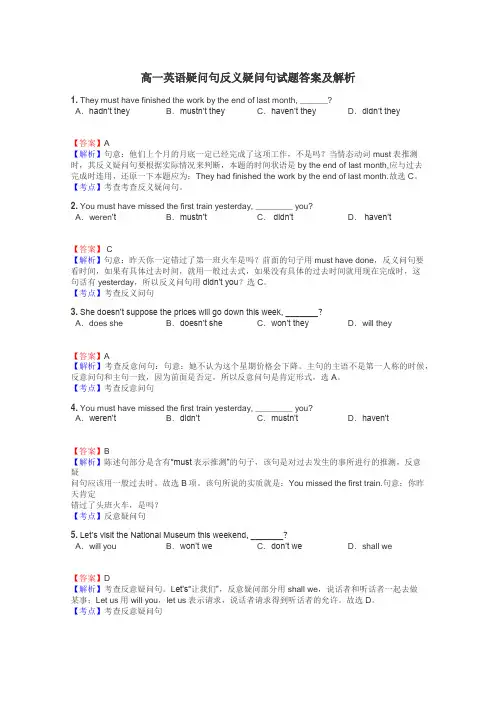
高一英语疑问句反义疑问句试题答案及解析1. They must have finished the work by the end of last month, ______?A.hadn’t they B.mustn’t they C.haven’t they D.didn’t they【答案】A【解析】句意:他们上个月的月底一定已经完成了这项工作,不是吗?当情态动词must表推测时,其反义疑问句要根据实际情况来判断,本题的时间状语是by the end of last month,应与过去完成时连用,还原一下本题应为:They had finished the work by the end of last month.故选C。
【考点】考查考查反义疑问句。
2. You must have missed the first train yesterday, ________ you?A.weren’t B.mustn’t C.didn’t D.haven’t【答案】 C【解析】句意:昨天你一定错过了第一班火车是吗?前面的句子用must have done,反义问句要看时间,如果有具体过去时间,就用一般过去式,如果没有具体的过去时间就用现在完成时,这句话有yesterday,所以反义问句用didn’t you?选C。
【考点】考查反义问句3.She doesn’t suppose the prices will go down this week, _______?A.does she B.doesn’t she C.won’t they D.will they【答案】A【解析】考查反意问句:句意:她不认为这个星期价格会下降。
主句的主语不是第一人称的时候,反意问句和主句一致,因为前面是否定,所以反意问句是肯定形式,选A。
【考点】考查反意问句4. You must have missed the first train yesterday, ________ you?A.weren’t B.didn’t C.mustn’t D.haven’t【答案】B【解析】陈述句部分是含有“must表示推测”的句子,该句是对过去发生的事所进行的推测,反意疑问句应该用一般过去时。
must反义疑问句的回答口诀1. Must的基本理解1.1 大家好,今天咱们来聊聊“must”这个词。
别小看它,其实它是个小巨人!在英语中,must通常表示“必须”或者“一定要”,它给人的感觉就像是一个不容置疑的命令,嘿,你得去做哦!你想啊,这种词用得好,简直是信心满满的代名词。
1.2 不过,作为小巨人的“反义疑问句”,它可就有点意思了。
比如说,你可能听过这样一句:“You must be tired, mustn't you?” 这句话意思是“你一定累了,对吧?”这可是一门艺术,轻松带着点小调侃,简直是社交场合的必备技能呀!2. 反义疑问句的魅力2.1 首先,反义疑问句的魅力在于,它能让对话更有趣。
你想啊,要是直接问“你累了吗?”多没劲啊!而说“你一定累了吧?”就多了些温暖的关心和一点儿调侃,感觉一下子拉近了距离,心里暖洋洋的。
2.2 这里面还有一个技巧:反义疑问句的回答一般会跟上一个肯定的前提。
如果你问“You must be happy, mustn't you?”,那基本上可以肯定,回答的人会说“Yeah, I am!” 这就是个正循环,大家都开心,气氛也轻松。
3. 使用反义疑问句的场合3.1 反义疑问句可以用在很多场合,朋友之间的闲聊、职场的交流,甚至是家庭聚会。
比如说,家里有小孩,你跟他玩游戏时说:“You must have had fun, mustn't you?” 这不仅能鼓励小朋友,还能让气氛更加融洽,简直是一举两得!。
3.2 当然,别忘了,反义疑问句还可以加点幽默感。
比如说,在某个聚会上,你看到朋友刚吃完一大盘子炸鸡,就可以问:“You must be full, mustn't you?”这时,他可能会哈哈大笑,心里想“哪里够呢?我还想再来一盘!”这种小互动,总是让人觉得暖心又有趣。
4. 如何正确使用反义疑问句4.1 说了这么多,咱们再来看看怎么正确使用反义疑问句。
must 的三种反义疑问句既然多数人感到麻烦我就来讲一讲must反义疑问句的用法。
你记住,must反义疑问句就三种可能:①must②needn't③变换句式下面来讲一讲他们分别的用法,一般考试就这三种可能!1、mustn't→mustmustn't在陈述句中的意思一般是不允许,禁止,所以他的反义疑问句用must或may例:You mustn't smoke here, must you?或may you?2、必须→needn't当must在陈述句中作“必须”解时,它的反义疑问句就变成needn't例:You must go now ,needn't you?3、变换句式在must表示推测,做“一定,准是”,简单的说就是must用于虚拟语气时像数学一样我们引入一个“常量”——I am sure that下面就能你那句话作为例子,我们变换一下。
He must have come yesterday. 变换句式作I am sure that he came yesterday. 好我们应该分清,反义疑问句问的应该是I am sure that 后面的从句所以,按照一般反义疑问句的规则得出结果I am sure that he came yesterday, didn't he?最后再把句子还原He must have come yesterday,didn't he?此题解答完毕。
下面是我搜索英国和美国语料库的结果:英国语料库:Davies, Mark. (2004-) BYU-BNC: The British National Corpus. Available online at /bnc.1. I was just thinking I bet that Helen was pleased then cos she must have passed, mustn't she?2. Yes. Now it must have been mustn't it, a possibility, if been there at all, that he was hiding under that bed?3. Exactly why, he must have had some sympathy, mustn't he?.4. …she must have passed mustn't she?5. He must have been interested in cooking, mustn't he?6. Yeah well I mean he must have gone in the hospital to her mustn't he?8. You must have touched her up the wrong way. --Yeah, I must have done mustn't I?9. Now it must have been mustn't it, a possibility, if been there at all, that he was hiding under that bed?10. Exactly why, he must have had some sympathy, mustn't he?.11. He must have been interested in cooking, mustn't he?12. Yeah well I mean he must have gone in the hospital to her mustn't he?13. Yeah, I must have done mustn't I?14. Somebody must have reported him, though, mustn't they?15. Abruptly she stood up and crossed to the window. "I must have done , mustn't I?"16. You must have seen the seals, though, didn't you?17. Exactly why, he must have had some sympathy , mustn't he ?.18. And your sister's ten years older than you so they must 've been there ten years plus , mustn't they ?19. They have a serious side but they must have a lighter side as well , mustn't they ?20. It must be , mustn't it ?21. Yeah. The profit would have been minus cos the costs would still be there so it must be a cancellation . Mustn'tit ?22. Yes, now this shows it must be his imagination , mustn't it ?23. …they must know there is a risk , mustn't they .24. It must mean something , mustn't it ?25. Six pairs of knickers must be enough , mustn't it , Charlie?26. Then it must be Madame V in Paris , mustn't it ?27. Everybody who sees her must love her , mustn't they , Ellen?28. But he must like her a bit , mustn't he ?29. Saturday night. Yeah? Yeah. So he must be doing well, mustn’t he?30. Yeah. Okay. So what, they mus t be staying, staying the Saturday night, mustn’t they?31. You must have seen the seals, though, didn’t you?(用didn't的只搜到这一例)美国语料库:/1. You must have enjoyed those, didn't you?2. And you must have had a name, didn't you?3. Oh Patrick, I must have told you -- didn't I?4. Must have seemed like an eternity, didn't it, holding your breath?5. Must have had three kids, did she?6. I'm sure they must be exaggerating, aren't they, Professor?7. You must have called an undertaker by now, haven't you?还是英国语料库:推断:It must mean something , mustn't it?Everybody who sees her must love her , mustn't they, Ellen?But he must like her a bit , mustn't he?Yes, now this shows it must be his imagination , mustn't it?he must have had some sympathy , mustn't he?必须:Well they must do them Sarah , mustn't they?First I must wash , mustn't I?。
m u s t反义疑问句------------------------------------------作者xxxx------------------------------------------日期xxxxMust相关的反义疑问句反义疑问句最大最主要考点1.must have done.表示对过去某事的肯定猜测,翻译成: 准是…一定…其否定或疑问形式都用can/could来表示。
例如:since the road is wet,it must have rained last night.2;当然对现在发生或者将来发生的事情,要用must do表示猜测,否定为can’t dohe must understand that we mean business.You must be hungry after a long walk.反意疑问句中含有Must的情况主要有以下几种:1)作为情态动词表“必须”,这时反意疑问句直接用mustn'/needn't2)当must表示推测时又分以下几种情况:a:对现在事实的推测,反意疑问句与must后面的动词呼应,如:You must be joking,aren't you ?b:对过去事实的推测,表示动作的时候用did 当助动词,表示状态时用was,如:Mr Green must have been punished for his being rude at the meeting,didn‘t he ?(格林先生一定因为昨天在会上鲁莽的行为被处罚了,是吗?)被处罚表示一个动作She must have been a policeman ,wasn't she ?(她过去一定是个警察,是吗?)是警察表示一种状态对现在情况的推测,问句部分用主动词(do, be)一般现在时的适当形式。
若是现在进行时,问句部分用现在进行时的适当形式表示。
解析must在反义疑问句中的应用摘要:反义疑问句作为特殊句式中的一种,在近年高考中有所涉及,如2009年的湖南高考题第32题,2009年辽宁高考题第34题以及2009年陕西高考题的第16题。
而情态动词must在反义疑问句中的用法要有它在陈述句部分中的意义决定。
这是高考中的难点。
本篇文章主要谈谈如何解陈述句中还有must 是反义疑问句。
关键词:must 反义疑问句∙反义疑问句概述反义疑问句是附加在陈述句之后,对陈述句所表示的事实或观点提出疑问的句子。
附加疑问句实际上是一种简略的一般疑问句。
其主要结构是;陈述句(主语+谓语---),+助动词/情态动词/be动词+主语(代词形式)?其基本原则是:前肯定,后否定;前否定,后肯定。
∙Must在反义疑问句中的应用对于陈述句中含有must 的反义疑问句,其反义疑问部分要视情况而定。
1. 当must表示“必须”,“有必要”,“应该”时,反义疑问部分为mustn’t/needn’t ---?Eg: We must study hard at Engish, mustn’t/needn’t we?You must finish your homewo rk in a hour, mustn’t/needn’t you?You mustn't stop your car here, must you?They must finish the work today, needn't they?1. 当must表是推测时,分四种情况1. 对现在情况的推测,反义疑问部分与must后面的动词相呼应:是be动词,反义疑问部分用isn’t/aren’t---?是实义动词用don’t/doesn’t---?Eg: you must be joking, a ren’t you?He must be ill, isn’t he?You must know the answer to the exercise, don't you?(2)对过去动作的推测,此时must的表现形式为must have done,a). 单纯表示对过去的推测(一般句中有明确的过去时间状语),与现在无关, 反意疑问句附加部分“didn't---?”。
have done的反义疑问句的用法-回复反义疑问句是英语中的一种语法结构,用于表达一种疑问和反问的关系,常常用于表示对对方陈述或提问的怀疑或肯定。
本文将围绕“have done 的反义疑问句的用法”为主题,一步一步回答,详细阐述该语法结构的基本规则、使用场景以及注意事项。
一、什么是反义疑问句?反义疑问句是一种特殊的语法结构,由一个陈述句和疑问句组成。
其目的是通过反问的方式,进一步确认对方的陈述或提问的真实性或准确性。
反义疑问句通常具有陈述句的形式,而疑问句部分则由一个助动词、情态动词或连词以及主语和不定式构成。
二、have done的反义疑问句的基本规则1. 如果陈述句为肯定形式(affirmative),反义疑问句应为否定形式(negative)。
反义疑问句的主要动词常是助动词do或情态动词。
2. 如果陈述句为否定形式(negative),反义疑问句应为肯定形式(affirmative)。
三、have done的反义疑问句的使用场景1. 表达对某件事实或陈述的确认。
例如:- You have finished your homework, haven't you?- 你已经完成作业了,是吗?- No, I haven't.- 不对,我还没有完成。
2. 表示请求对方确认自己所说的内容。
例如:- You haven't seen her, have you?- 你没有见过她,是吗?- Yes, I have.- 是的,我见过。
3. 用于宾语从句中,表示对所述内容的再次确认。
例如:- She said you have been to Paris, haven't you?- 她说你去过巴黎,对吗?- No, I haven't been to Paris.- 不对,我没有去过巴黎。
四、have done的反义疑问句的注意事项1. 在反义疑问句中,主语的人称和数要与陈述句中的主语保持一致。
情态动词+动词完成时,即情态动词+have+done.表示对过去的行为或动作进行推测,评论或者判断.
1. must have done.
表示对过去某事的肯定猜测,其否定或疑问形式都用can/could来表示。
例如:Since the road is wet, it must have rained last night.
2;当然对现在发生或者将来发生的事情,要用must do表示猜测,否定为can’t do He must understand that we mean business.
You must be hungry after a long walk.
反意疑问句中含有Must的情况主要有以下几种:
1)作为情态动词表“必须”,这时反意疑问句直接用mustn’t/needn't
2)当must表示推测时又分以下几种情况:
a:对现在事实的推测,反意疑问句与must后面的动词呼应,如:
You must be joking, aren’t you?
b:对过去事实的推测,表示动作的时候用did 当助动词,表示状态时用was,如:Mr Green must have been punished for his being rude at the meeting,didn‘t he ?(格林先生一定因为昨天在会上鲁莽的行为被处罚了,是吗?)被处罚表示一个动作She must have been a policeman ,wasn't she ?(她过去一定是个警察,是吗?)是警察表示一种状态
对现在情况的推测,问句部分用主动词(do, be)一般现在时的适当形式。
若是现在进行时,问句部分用现在进行时的适当形式表示。
若是there be结构,问句用isn't/aren't there。
如:
1)He must be there, isn’t he?
2)He must have a big family, doesn’t he?
3)He must be waiting outside, isn’t he?
4)There must be some students in the room, aren’t there?
对已发生的过去情况的推测,若陈述句谓语部分有“must have done”,而且有表示过去的时间状语,问句部分用didn't;若没有表示过去的时间状语,问句部分用haven't或hasn't。
如:
1)They must have gone there last night, didn’t they?
2)They must have arrived by now, haven’t they?(根据by now来判断)
3)They must have been to the Great Wall, haven’t they?
若是被动,应按被动结构来处理。
如:
1)The room must have been c leaned yesterday, wasn’t it?
2)The room must have been cleaned, hasn’t it?
若句中有表示过去完成时的时间状语,问句部分应用hadn't.如:
They must have learnt 5000 English words by the end of last term, hadn’t they?
(本题中must表推测,如果将它去掉,还原为真实句就是They had learnt 5000 English words by the end of last term.因此,反意问句是hadn't)。